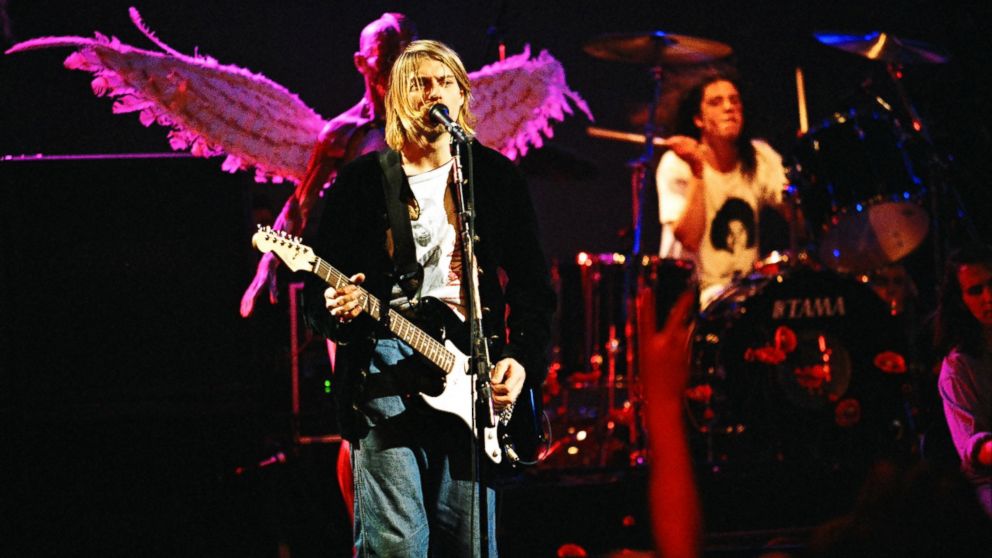Nirvana's 'Nevermind' Turns 25
The album debuted 25 years ago today.

— -- On Sept. 24, 1991, Nirvana released their mind-blowing sophomore album, “Nevermind.” The album was also their major-label debut as the band shifted over to DGC records in part because it was also the home of Sonic Youth.
It’s strange to think that the time since Nirvana released “Nevermind,” is one year longer than the age of Kurt Cobain when the album was released, or that in two years the album will be as old as Cobain’s entire lifetime.
I was 14 when I bought “Nevermind.” I bought it and U2’s “Achtung Baby!” both on the same day and both on cassette. Both albums remain important touchstones for my own musical growth, but “Nevermind” holds a very special place in my heart. It spoke to me in a very unexpected way. I was a pop kid, who didn’t realize I had an inner-punk side until I heard “Nevermind.” The machismo-heavy “hard rock” and cheeseball “hair bands” of the 80s left me incorrectly thinking that I didn’t like hard-edged music. I hadn’t really heard much punk yet. The second I heard “Smells Like Teen Spirit,” my whole world changed. That song also ushered in a vast shift of epic proportions on a wider scale. Its release was a defining touchstone of the blossoming “alternative” movement.
All you have to do is look at the Billboard pop chart from Jan. 11, 1992, when “Smells Like Teen Spirit” peaked at number 6 to see that the song stood out like a sore thumb, sandwiched between two Hammer singles in a top 10 that included hits by Mariah Carey, Color Me Badd, CeCe Peniston, Marky Mark and Boyz II Men. That week, Michael Jackson’s “Black Or White” was the number one single.
In the wake of the explosion that “Smells Like Teen Spirit” caused, pop stations started paying attention to Pearl Jam’s album “Ten,” an album that had come out a month prior. Both bands were rooted in harder influences. While Nirvana was fueled by punk with a uniquely chaotic bend, Pearl Jam worked from more of a classic-rock framework.
Listening to “Nevermind” in 2016, it still sounds revolutionary. Butch Vig’s production and Andy Wallace’s mixing are quite slick in comparison to the band’s 1989 debut, “Bleach,” but that helped these songs blossom and cross over. Kurt Cobain was a product of a disaffected, blooming counterculture hitting its apex. He was rallying against the mainstream. In the end, he gave us a collection of perfect pop songs with strong hooks that just happened to be caked with fuzz.
Sure, “Come As You Are” was admittedly ripped a little from Killing Joke’s song “Eighties,” and “Smells Like Teen Spirit” borrowed chord-progression elements from the Pixies’ song “Gouge Away,” but this album remains to this day a perfect burst. It helps that Dave Grohl’s forceful drumming effectively made a lot of these songs danceable, giving them more pop punch and Krist Novoselic’s bass lines had their own melodic drive, which is most evident in the quieter moments of “Lithium.” Here Nirvana perfected making unapologetically-venomous sounds unabashedly palatable.
Cobain fought stardom because it came with the “spokesman of a generation” mantle that weighed on him like an albatross. But it is evident from the booming immediacy of “Nevermind” that he was out to make hits and to change the world.
After Nirvana’s rise, acts like Smashing Pumpkins, Weezer, Beck, Green Day and countless others started getting air play. Labels were scrambling to find the next Nirvana. The Red Hot Chili Peppers, whose fifth album, “Blood Sugar Sex Magik,” was also released on the same day, after years of the band's toiling in the college-rock fringes scored a number one hit with “Under The Bridge.”
“Nevermind” was an album that made it safe to be different. Bands could write songs about darker subjects and still get airplay. It was a wonderfully visceral contusion of a record with an unexpectedly sweet center. “In Bloom,” for instance, has an astounding pop melody.
“Nevermind” is still finding fans. Look up any Nirvana video on YouTube and the comment section is riddled with notes from younger listeners saying that the band’s records still speak to them. With this album, Nirvana harnessed a somewhat intangible essence of a certain kind of angst. You can still hear their ghost in countless new acts popping up today. In a way, they helped to at least momentarily usher mainstream rock back to a no-frills, artistically and emotionally-driven core.
After Kurt Cobain’s suicide in 1994, pop radio would eventually go back to championing manufactured pop groups like the Spice Girls and the Backstreet Boys, but we have “Nevermind” largely to thank for helping to briefly birth one of the most open, eclectic and experimental periods in rock history. If only Cobain was still alive to see how his influence has lasted.
It should be noted that in addition to Nirvana’s “Nevermind” and Red Hot Chili Peppers’ “Blood Sugar Sex Magik,” Sept. 24 is also the 25th anniversary of the release of one of the greatest and most influential hip-hop records of all time, “The Low End Theory” by A Tribe Called Quest, which means three of the best and most influential albums of all time were released on the very same day. I would advise listening to all three records in a row this weekend. They all hold up extraordinarily well. Then you should lament the closed-minded nature of today’s “Top 40” radio.
Of course, at any moment a song like “Smells Like Teen Spirit” could come in, take us by surprise and totally change the tide.
Miracles can happen.




